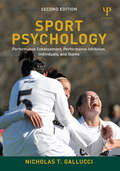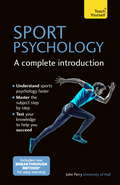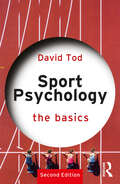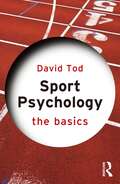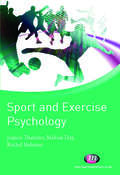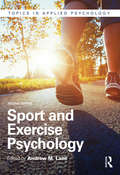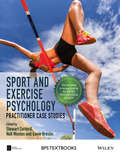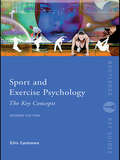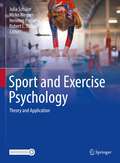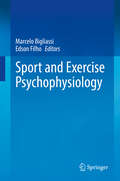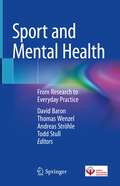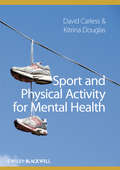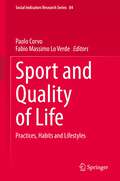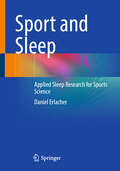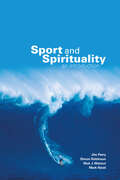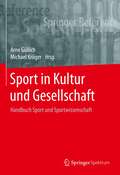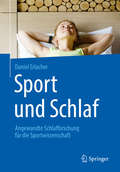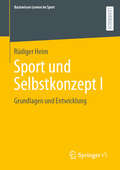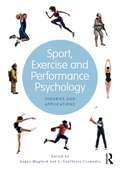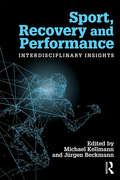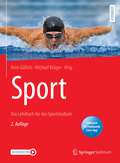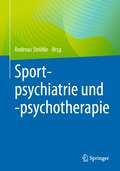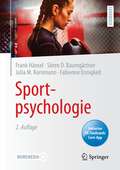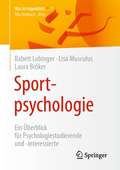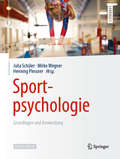- Table View
- List View
Sport Psychology: Performance Enhancement, Performance Inhibition, Individuals, and Teams
by Nicholas T. GallucciSport Psychology, 2nd Edition provides a synthesis of the major topics in sport psychology with an applied focus and an emphasis on achieving optimal performance. After exploring the history of sport psychology, human motivation, and the role of exercise, there are three main sections to the text: Performance Enhancement, Performance Inhibition, and Individuals and Teams. The first of these sections covers topics such as anxiety, routines, mental imagery, self-talk, enhancing concentration, relaxation, goals, and self-confidence. The section on Performance Inhibition includes chapters on choking under pressure, self-handicapping, procrastination, perfectionism, helplessness, substance abuse, and disruptive personality factors. While much of the information presented is universally applicable, individual differences based on gender, ethnicity, age, and motivation are emphasized in the concluding section on Individuals and Teams. Throughout, there are case studies of well-known athletes from a variety of sports to illustrate topics that are being explored.
Sport Psychology: Teach Yourself
by John PerrySport Psychology: A Complete Introduction is designed to give you everything you need to succeed, all in one place. It covers the key areas that students are expected to be confident in, outlining the basics in clear, jargon-free English and providing added-value features like summaries of key experiments and even lists of questions you might be asked in your seminar or exam.The book uses a structure that mirrors the way sports psychology is taught on many university courses, and is split into theory and application. Chapters in the first part include coverage of essential personality traits, including mental toughness, confidence, motivation and character. The chapters on applied sports psychology cover topics such as assessment, working with groups, skills training, coping techniques and working with coaches and children. There is also substantial coverage of measurement questionnaires, skills and routes to practice.Sport Psychology employs the 'Breakthrough Method' to help you advance quickly at any subject, whether you're studing for an exam or just for your own interst. The Breakthrough Method is designed to overcome typical problems you'll face as learn new concepts and skills.- Problem: "I find it difficult to remember what I've read."; Solution: this book includes end-of-chapter summaries and questions to test your understanding.- Problem: "Lots of introductory books turn out to cover totally different topics than my course."; Solution: this book is written by a university lecturer who understands what students are expected to know.
Sport Psychology: The Basics (The Basics)
by David TodSport Psychology: The Basics provides an accessible introduction to the fundamental ideas at the heart of Sport Psychology today. This new revised and updated second edition examines the links between sport participants’ behaviours, their personality, and their environment to identify the factors which affect performance. Exploring theory and practice, it uses case studies to illustrate how key areas of theory are applied within a sport psychologist’s practice, answering such questions as: • What is sport psychology and what do sport psychologists do? • What factors affect sporting performance? • How can sport psychologists help parents and sport organizations? • Which psychological characteristics are associated with achievement in sport? • How can sport psychologists help with athlete’s mental health? With a glossary of key terms, suggestions for further study, and ideas for improving performance, Sport Psychology: The Basics is an ideal introduction for students of sport and coaches who would like to know more about how sport psychologists address questions about human behaviour in sport.
Sport Psychology: The Basics (The Basics)
by David TodSport Psychology: The Basics provides an accessible introduction to the fundamental ideas at the heart of Sport Psychology today. It examines the links between sport participants’ behaviours, their personality and their environment to identify the factors which affect performance. Exploring theory and practice, it uses case studies to illustrate how key areas of theory are applied within a sport psychologist’s practice, answering such questions as: What is sport psychology and what do sport psychologists do? What factors affect sporting performance? Which psychological characteristics are associated with achievement in sport? How can performance be improved by using theory? With a glossary of key terms, suggestions for further study and ideas for improving performance, Sport Psychology: The Basics is an ideal introduction for students of sport and coaches who would like to know more about how sport psychologists address questions about human behaviour in sport.
Sport and Exercise Psychology (Active Learning in Sport Series)
by Joanne Thatcher Melissa Day Rachel RahmanThis is a comprehensive and accessible text on exercise and sport psychology for students on sport science/sport and exercise science degrees. It adopts an integrated, thematic approach and covers all the required theory, concepts and research, accompanied by case studies to illustrate the applied nature of the material being covered. The book is split into two major sections, covering exercise psychology and sport psychology, and each chapter supports students as they progress from clear introductory material to more advanced discussions.
Sport and Exercise Psychology (Topics in Applied Psychology)
by Andrew M LaneThe new edition of Sport and Exercise Psychology asks four fundamental questions that get to the heart of this flourishing discipline: What inner states influence what people think, feel, and behave? How can people manage or self-regulate their own inner states? How can sport and exercise psychology professionals help people manage their inner states? Is sport psychology just a placebo effect? Taking an applied perspective that bridges the gap between sport and exercise, the book answers these questions by covering the key topics in the field, including confidence, anxiety, self-regulation, stress and self-esteem. There are also chapters on the role of music in performance, imagery and exercise addiction. Each chapter is written by an expert in that field, and includes a range of features illustrating specific issues, either within the research literature or their practical application. This is a comprehensive and engaging overview of an evolving discipline, and will be essential reading to any student of sport and exercise psychology. It will also be of huge interest to athletes and coaches seeking an accessible understanding of the role of psychology in sport.
Sport and Exercise Psychology: Practitioner Case Studies
by Gavin Breslin Stewart Cotterill Neil WestonSport and Exercise Psychology focuses on the most current issues in the field, integrating research and practice to develop a coherent understanding of current knowledge, future research directions and applied implications within the field. This is the first book to include theory-based case studies for sport performance, exercise and skill acquisition in one publication International authors dissect their case studies to highlight best practice/interventions in similar situations The theoretical basis behind each intervention is clearly explained, along with practical examples of how to work as a sport and exercise psychologist Provides content that is directly applicable to those students wishing to enter the profession via various national accreditation schemes, in addition to providing chartered psychologists with a text that can directly inform their reflections of their own practise The book is supported by an online learning environment that includes 'talking heads' videos for each chapter, further resources, questions and links to relevant external materials.
Sport and Exercise Psychology: The Key Concepts (Routledge Key Guides)
by Ellis CashmoreNow including exercise psychology terms for the first time in its second edition, Sport and Exercise Psychology: The Key Concepts offers a highly accessible introduction to this fascinating subject, its central theories and state-of-the-art research. Over 300 alphabetically-ordered entries cover such diverse terms as: adherence aggression emotion exercise dependence home advantage kinesiphobia left-handedness motivation retirement self-confidence. Cross-referenced, with suggestions for further reading and a full index, this latest key guide contains invaluable advice on the psychology of sport and exercise. A comprehensive A-Z guide to a fast-moving field of inquiry, this book is an essential resource for scholars, coaches, trainers, journalists, competitors, exercisers; in fact anyone associated with sport and exercise.
Sport and Exercise Psychology: Theory and Application
by Henning Plessner Julia Schüler Mirko Wegner Robert C. EklundThis textbook covers topics in sport and exercise psychology for students of psychology and sport science, as well as for sport practitioners who want to understand topics in sport psychology in more detail and depth.The book is divided into two main parts: Theory and Application. The first part covers the theoretical facets of sport and exercise psychology, and the close link between theory and practice, divided into the sub-disciplines of psychology (cognition, motivation, emotion, personality and development, and social processes). The second part focuses on the applications of sport and exercise psychology in the context of performance and health.With contributions from scholars across the globe, the book offers an international and timely perspective on the key fundaments of sport psychology. Taken together, these chapters provide a challenging yet accessible overview of the larger field of sport and exercise psychology. This book is suitable for readers at different levels of competence, supported with didactic elements (learning objectives and learning control questions) to find the right learning level.
Sport and Exercise Psychophysiology
by Edson Filho Marcelo BigliassiThis book addresses a critical gap in the literature, serving as a foundational resource for a rapidly evolving field that lacks a comprehensive reference point. It offers an in-depth exploration of research methods in exercise psychophysiology, beginning with a historical perspective before delving into key psychophysiological techniques and advanced methodologies for processing and interpreting biological data collected during exercise. Beyond methodology, the book examines core topics such as exercise tolerance, motivation, emotion regulation, attentional control, and cognition—unpacking the intricate psychophysiological mechanisms driving these phenomena. Designed to equip researchers and practitioners alike, it provides the necessary tools to design rigorous experiments and effectively apply complex psychophysiological methods in movement-related contexts. This resource is essential for anyone seeking a deeper understanding of how mind and body interact in the realm of exercise.
Sport and Mental Health: From Research to Everyday Practice
by David Baron Thomas Wenzel Andreas Ströhle Todd StullThis user-friendly, comprehensive and highly relevant book allows readers to gain a better understanding of mental health issues in sport and exercise. The field of sports psychiatry continues to grow globally at a rapid pace. This, in part, can be explained by the changing culture of sport leading to an appreciation of the role of psychiatric symptoms and syndromes in the world of sport, but also the increasing spread of both highly performance oriented and grass-roots basic sports and the associated risks in large sections of the population. The long-standing stigma attached to mental health problems, such as depression, anxiety, ADHD, suicide, brain injuries, substance-abuse, is being challenged not only by high-profile athletes, but also in public health and general mental health services. The book utilizes an innovative case-based and structured didactical format to provide short summaries of recent research by leading experts in the respective fields, as well as up-to date prevention and clinical guidelines for all relevant disorders in a way that is easily accessible to the large and growing groups interested and active in sports. This work is relevant for all mental health professionals and can also be used by a wider readership including medical doctors, psychologists, athletes and coaches. A second volume covers the role of exercise as an effective treatment for a number of common psychiatric conditions, such as depression, anxiety, eating disorders and substance abuse.
Sport and Physical Activity for Mental Health
by Kitrina Douglas David CarlessWith approximately 1 in 6 adults likely to experience a significant mental health problem at any one time (Office for National Statistics), research into effective interventions has never been more important. During the past decade there has been an increasing interest in the role that sport and physical activity can play in the treatment of mental health problems, and in mental health promotion. The benefits resulting from physiological changes during exercise are well documented, including improvement in mood and control of anxiety and depression. Research also suggests that socio-cultural and psychological changes arising from engagement in sport and physical activity carry valuable mental health benefits. Sport and Physical Activity for Mental Health is an evidence-based practical guide for nurses, allied health professionals, social workers, physical activity leaders, and sport coaches. The authors provide comprehensive analysis of a broad range of client narratives, integrating theory and the latest research to explore the effectiveness of various interventions. The book offers readers detailed recommendations, suggestions, and ideas as to how sport and physical activity opportunities can be tailored to provide the greatest mental health benefits.
Sport and Quality of Life: Practices, Habits and Lifestyles (Social Indicators Research Series #84)
by Paolo Corvo Fabio Massimo Lo VerdeThis book brings together essays analyzing the impact of sport and physical activity on psychophysical well-being and quality of life, through multidisciplinary and multi-country studies. It discusses how the commercial dimension of sport entertainment and recreational dimension of sport practice have been increasingly brought together in discussions on individual health and well-being, and social integration and participation. It therefore considers the relationship between sports practice, enjoyment of sporting events, sport participation and quality of life. The chapters examine various aspects of the practice of sport for professional and recreational purposes from the perspective of age, life course research, physical education in schools, government investment in sport activities across various stages of life, the rise of sports tourism as a global industry and how social networks and web apps are changing the perception of fitness. This innovative book is of interest to scholars and students of sport science, leisure studies, and well-being research.
Sport and Sleep: Applied Sleep Research for Sports Science
by Daniel ErlacherAt first glance, sport and sleep appear to be two topics that could hardly be more different: Physical and mental peak performance on the one hand - inactivity and unconsciousness on the other. This book is dedicated to this new issue and uses various examples from sports practice to show that there are numerous points of contact here. A theoretical section at the beginning introduces the basics of sports science and sleep research, while the much larger section is dedicated to its application in a sporting environment. Among other things, the sleep behaviour of athletes is presented, including how jet lag in sport and sleep deprivation can become noticeable before sporting performances and competitions. It also deals with the dream experience of motorised actions and training in lucid dreams. The book is aimed at those interested in sports science, sleep medicine, psychology and neurology, as well as trainers and sports enthusiasts who would like to read up on the subject in moredetail.
Sport and Spirituality: An Introduction
by Simon Robinson Nick Watson Jim Parry Mark NestiSport science can quantify many aspects of human performance but the spiritual dimensions of sports experience cannot be fully understood through measurement. However, the spiritual experience of sport – be it described as ‘flow’, ‘transcendence’ or the discovery of meaning and value – is central both to our basic motivation to take part in sports, and to achieving success. Sport and Spirituality: An Introduction explores these human aspects of sports experience through the perspectives of sport psychology, philosophy, ethics, theology and religious studies. It includes discussions of: Spirituality in the postmodern era Spirituality, health and well-being Theistic and atheistic perspectives on sport and the spiritual Nature and transcendence – the mystical and sublime in outdoor sport Applied sport psychology and the existential Spiritual perspectives on pain, suffering and destiny Sport, the virtues, ethical development and the spirit of the game The Olympic Games and de Coubertin’s ideas of the ‘religio athletae’. This groundbreaking text will be a valuable resource for students of sport and exercise studies, sports coaching, physical education and sport and health psychology. This book should be read by all those interested in the preparation, performance and well-being of athletes.
Sport in Kultur und Gesellschaft: Handbuch Sport und Sportwissenschaft
by Michael Krüger Dieter Hackfort Eike Emrich Freya Gassmann Christian PierdziochDieses Handbuch bietet einen kompletten Überblick über die zentralen Themen der Sozialwissenschaften im Sport. Es richtet sich an das breite Publikum der Fachleute, Lehrenden und Wissenschaftler*innen in Sport und Sportwissenschaft. Hier können Sie sich kompakt und kompetent über den Stand der Wissenschaft zur Kultur des Sports informieren. Das Handbuch ersetzt bisherige Lexika und Handbücher zum Sport. Die Texte sind verständlich formuliert und anschaulich aufbereitet. Die knapp 50 Kapitel in diesem Band geben Ihnen den aktuellsten wissenschaftlichen Stand über die ökonomischen, sozialen, kulturellen, politischen, rechtlichen, pädagogischen und psychologischen Zusammenhänge des Sports. Zudem erhalten Sie Hinweise auf die wichtigste nationale und internationale Forschungsliteratur. Die Herausgeber: Arne Güllich ist Professor für Sportwissenschaft und leitet das Fachgebiet Sportwissenschaft an der TU Kaiserslautern. Er forscht in den Bereichen Jugendsport, Talententwicklung, Training und Förderstrukturen. Güllich hat zuvor im Deutschen Olympischen Sportbund als Leiter der Stabsstelle Grundsatzfragen gearbeitet. Praxiserfahrungen hat er als Trainer vom Jugendbereich bis zu den Olympischen Spielen gesammelt. Michael Krüger ist Professor für Sportwissenschaft an der Westfälischen Wilhelms-Universität zu Münster. Seine Forschungsschwerpunkte liegen im Bereich der Sportpädagogik und -geschichte, der wissenschaftstheoretischen Grundlagen der Sportwissenschaft, der olympischen Geschichte und Erziehung sowie von ethischen und pädagogischen Fragen des Sports. Er ist Verfasser und Herausgeber zahlreicher wissenschaftlicher Arbeiten zum Sport sowie mehrerer Lehr- und Handbücher zur Sportwissenschaft und Sportpädagogik.
Sport und Schlaf: Angewandte Schlafforschung für die Sportwissenschaft
by Daniel ErlacherSport und Schlaf scheinen auf den ersten Blick zwei Themen, die unterschiedlicher kaum sein können: Körperliche sowie mentale Höchstleistungen auf der einen Seite – Inaktivität und Bewusstlosigkeit auf der anderen. Dieses Buch widmet sich diesem neuen Sachverhalt und zeigt anhand unterschiedlicher Beispiele aus der Sportpraxis, dass es hier zahlreiche Anknüpfungspunkte gibt. Ein theoretischer Teil führt zu Beginn in die Grundlagen der Sportwissenschaft und Schlafforschung ein, der weitaus größere Teil widmet sich der Anwendung im sportlichen Umfeld. Unter anderem wird das Schlafverhalten von Athletinnen und Athleten vorgestellt, wie sich Jet Lag im Sport und Schlafdeprivation vor sportlichen Leistungen als auch vor Wettkämpfen bemerkbar machen kann. Ebenso werden das Traumerleben von motorischen Handlungen sowie das Training im Klartraum behandelt. Das Buch richtet sich an Interessierte aus der Sportwissenschaft, Schlafmedizin, Psychologie, Neurologie, aber auch an Trainer und Trainerinnen, sowie an sporttreibenden Personen, die sich hier fundierter einlesen möchten.
Sport und Selbstkonzept I: Grundlagen und Entwicklung (Basiswissen Lernen im Sport)
by Rüdiger HeimSeit langem wird dem Sport eine förderliche Wirkung auf das Selbstkonzept, insbesondere im Kindes- und Jugendalter, zugeschrieben. Allerdings sind die entsprechenden wissenschaftlichen Befunde mittlerweile weit verzweigt und unübersichtlich. Dieses Lehrbuch gibt einen kompakten Überblick über die sportbezogene Selbstkonzeptforschung und ihre theoretischen wie empirischen Erträge. Im Mittelpunkt dieses ersten Bandes steht eine übersichtliche Darstellung des mehrdimensionalen Modells des Selbstkonzepts und seiner Entwicklung sowie der Bedeutung für das Sportengagement.
Sport, Exercise, and Performance Psychology: Theories and Applications
by J. Gualberto Cremades Angus MugfordThis book brings together world-class professionals to share theoretical understanding applied to sport, exercise and performance domains. It highlights how to be more effective in developing psychological skills, context and understanding for educators, students and professionals. From both academic and practitioner perspectives, this book takes readers through contextual understanding of this field of study and into a wide variety of important areas. Specifically, the chapters focus on the mind-body relationship and performance challenges, and on core mental skills applied across different sport, exercise and performance examples (including professional athletes, normal exercise populations and military service members). The final section expands the context into the role of relationships and performance in group settings to cover a broad practice of modern day applied performance psychology.
Sport, Recovery, and Performance: Interdisciplinary Insights
by Michael Kellmann Jürgen BeckmannSport, Recovery and Performance is a unique multi-disciplinary collection which examines both the psychological and physiological dimensions to recovery from sport. Including contributions from medicine, neuroscience, psychology and sport science, the book expertly explores the implications for applied and strategic interventions to both retain and stabilize performance, and promote health and well-being. Including chapters written by its leading experts, the book represents an important milestone in this evolving field of study. It covers issues around measuring recovery, the impact of overtraining on sleep and mental health, and addresses topics such as the impact of travel on performance. The book informs not only how managing recovery can improve performance, but also offers insights in how recovery can sustain athletes’ physical and mental health. Citing research from a range of individual and team sports, as well as extreme situations and the workplace, this is an important book that will be widely read across the sport sciences.
Sport: Das Lehrbuch für das Sportstudium
by Martin LayDie vollständig überarbeite Neuauflage des Lehrbuchklassikers knüpft an das bewährte Konzept der Erstauflage an und umfasst alle wesentlichen Themenfelder und Inhaltsbereiche für ein erfolgreiches Sportstudium. Abseits einer grundlegenden Aktualisierung zeichnet sich die Folgeauflage insbesondere durch eine Vielzahl an digitalen Zusatzmaterialien aus. Für Studierende wird somit eine innovative Möglichkeit zur multimedialen Wissensvermittlung geschaffen, die weit über das geschriebene Buch hinausgeht. In diesem Lehrbuch erfahren Sie die aktuellen Erkenntnisse zu den vielfältigen Facetten des modernen Sports: Vom Schulsport über den Freizeit-, Breiten-, Fitness- und Gesundheitssport bis hin zum Wettkampf- und Spitzensport. Renommierte Expertinnen und Experten der Trainingswissenschaft, Medizin, Sozialwissenschaften und Pädagogik erklären die aktuelle Theorie und Praxis des Sports speziell für Ihr Sportstudium.Herausragende Merkmale sind:Verständliche Erklärungen von Fachkräften mit ausgiebiger PraxiserfahrungHervorhebung des Wichtigsten in prägnanten MerksätzenZahlreiche praktische Beispiele, Verbindung von Theorie und PraxisAnschauliche Darstellung mit ca. 400 farbigen Bildern und GrafikenUmfangreiches Glossar zum Nachschlagen von DefinitionenDigitale Übungsfragen zur Lernkontrolle und PrüfungsvorbereitungAbrufbare Videos für eine multimediale WissensvermittlungDas Lehrbuch Sport konzentriert sich auf die Inhalte der Bachelorstudiengänge mit Sportbezug. Nahezu alle Module des Bachelorstudiums finden sich in den Kapiteln wieder. Zusätzlich bietet es zentrale Grundlagen für die verschiedenen Sport-Masterstudiengänge, Fort- und Weiterbildungen von Sportlehrkräften und Sportfachpersonal in den vielfältigen Berufsfeldern sowie für den Leistungskurs Sport.
Sportpsychiatrie und -psychotherapie
by Andreas StröhleDie Sportpsychiatrie und -psychotherapie ist im deutschsprachigen Raum eine noch jüngere Spezialisierung, während Sportmedizin in Deutschland inzwischen eine fächerübergreifende ärztliche Zusatzweiterbildung darstellt. Sportpsychiatrische Kenntnisse und Expertise gewinnen jedoch sowohl im Breiten- als auch im Leistungssport zunehmend an Bedeutung, nicht zuletzt durch Erkrankungen prominenter Leistungssportler und die Diskussion ihrer Ursachen und Folgen. Auch in der Entstehung und Behandlung psychischer Erkrankungen in der Allgemeinbevölkerung kommt der Rolle von Bewegung und Sport eine immer größere Bedeutung zu. Dieses Buch bringt diese beiden Aspekte der Sportpsychiatrie und -psychotherapie zusammen. Namhafte Autoren aus der Sportmedizin, Physiologie, Psychologie, Sportpsychologie, Psychiatrie und Psychotherapie bieten zunächst einen Überblick über die Grundlagen von Sport, Bewegung und Training sowie Basiskenntnisse der Leistungs- und Sportpsychologie. Das Kernstück des Buches umfasst die Darstellung der Sport- und Bewegungstherapie bei psychischen Erkrankungen in der Allgemeinbevölkerung einerseits sowie der psychischen Erkrankungen und Besonderheiten bei (Leistungs-)Sportlern andererseits. Das Werk richtet sich an Therapeuten und Ärzte unterschiedlicher Disziplinen, insbesondere Psychiater und Sportmediziner, aber auch Psychologen und Psychotherapeuten sowie andere Berufsgruppen in Medizin, Psychiatrie und Psychotherapie, die sich für Sport und Sporttherapie interessieren. Daneben sollen aber auch Helfer und Professionelle aus dem Sport angesprochen werden, um einen Zugang zu psychischen Erkrankungen im Leistungssport zu bekommen.
Sportpsychologie
by Frank Hänsel Fabienne Ennigkeit Sören D. Baumgärtner Julia M. KornmannDiese Neuauflage des kompakten Lehrbuchs der Sportpsychologie bietet Studierenden der Sportwissenschaft wie auch der Psychologie einen optimalen Überblick. Grundlegende Fragestellungen und Themen der Sportpsychologie werden kompakt und gut verständlich erklärt. Da sich die Sportpsychologie ganz grundsätzlich mit dem menschlichen Erleben und Verhalten in sportlichen Situationen beschäftigt, werden Fragestellungen aus einem breiten Spektrum aufgegriffen. Die Antworten basieren auf der aktuellen Forschung und weisen beispielhaft auf Anwendungen für die Sportpraxis hin. Das Lehrbuch ist hilfreich zur Prüfungsvorbereitung und ein Lesegenuss für alle, die an den wissenschaftlichen Grundlagen der Sportpsychologie interessiert sind. Dazu bietet die inkludierte Flashcard App digitale Frage- und Antwortkarten zum Selbsttest. Zusätzlich finden Sie digitale Zusatzmaterialien auf der Lehrbuch-Begleitwebseite.
Sportpsychologie: Ein Überblick für Psychologiestudierende und -interessierte (Was ist eigentlich …?)
by Babett Lobinger Lisa Musculus Laura BrökerDiese Einführung aus der Reihe „Was ist eigentlich …?“ gibt einen kurzen Überblick über das Fach „Sportpsychologie“. Sie will Psychologiestudierenden zu einer Orientierung in dieser Teildisziplin verhelfen. Sie bietet aber auch für Fachfremde, die an psychologischen Themen interessiert sind, einen ersten Einblick in die Phänomene, Denkweisen, Modelle und methodischen Herangehensweisen in der Sportpsychologie. Die Leserinnen und Leser finden hier aktuelle Forschungsergebnisse, die in Hinblick auf ihre wissenschaftliche Relevanz eingeordnet, in Bezug zur Sportpraxis gebracht und diskutiert werden.
Sportpsychologie: Grundlagen und Anwendung
by Henning Plessner Julia Schüler Mirko WegnerDieses Lehrbuch richtet sich an Studierende der Psychologie und Sportwissenschaft sowie an Personen, die in der Sportpraxis tätig sind und Themen der Sportpsychologie genauer und tiefgehender verstehen möchten. Zahlreiche auflockernde didaktische Elemente ermöglichen Ihnen das leichtgängige und freudvolle Lernen komplexer Sachverhalte. Im ersten Teil lernen Sie den Facettenreichtum der Sportpsychologie sowie die Untrennbarkeit von Theorie und Sportpraxis kennen. Theoretische Grundlagen sind nach den Subdisziplinen der Psychologie (Kognition, Motivation, Emotion, Persönlichkeit und soziale Prozesse) untergliedert und verständlich sowie praxisnah erläutert. Dabei werden Fragen beantwortet wie: Welche kognitiven Prozesse führen zu guten Entscheidungen in kritischen Sportspielsituationen? Wie entsteht intrinsische Motivation zum Sporttreiben? Welche Folgen hat Wettkampfangst? Trägt Sport zur Persönlichkeitsentwicklung bei? Wie hängen Teamklima und sportliche Leistung zusammen? Im zweiten Teil erfahren Sie alles Wichtige über die Anwendung der Sportpsychologie in den Kontexten Leistung und Gesundheit. Wie sehen beispielsweise theoriebasierte psychologische Trainings zur Leistungssteigerung im Spitzensport aus und wie effektiv sind diese? Besteht ein Zusammenhang zwischen Sport und Gesundheit? Die von den jeweiligen Fachexperten und -expertinnen verfassten Kapitel stellen eine umfassende und optimale Prüfungsvorbereitung dar. Zudem unterstützen die klare Struktur und Didaktik sowie die in sich abgeschlossenen Kapitel dabei, sich beim Vertiefen oder Nachlesen auf einzelne Inhaltsbereiche zu fokussieren. Das Werk ist prüfungsrelevant und regt zugleich mit wertvollen Impulsen zum Mit- und Weiterdenken an.
